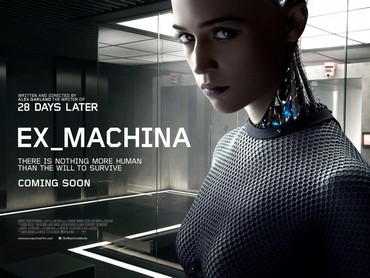The fear of failure is a sense of cowardice we may witness the most powerful people suffer, causing apprehension to embrace the road before them, and, very often, a feeling of aversion to life altogether. This particular angst, if not dealt with appropriately, adequately, or immediately, will seep through the veins of the fearful like a poison, really derailing their ability to receive the gifts they deserve in life and hindering their capacity to exert their own, personal skills for the greater good.
These inherent personal dilemmas are explored throughout much of Danny Boyle’s work, in horror films like “28 Days Later”, “Sunshine”, and “Dredd”, which are all features based on human fear and the innate survival instinct it triggers, questioning one’s own moral code in the process. What would you do to live? To survive? Well, In his latest work “Ex Machina”, Boyle explores fear based survival instincts, not necessarily through conventional life or death scenarios, though they are definitely probed and examined, but through male-female relations and, namely, sexism. How do women intend to survive in male-dominated arenas? And, if possible, achieve success in realms with a severely uneven gender ratio? In addition to possessing artificial intelligence? Boyle really provides a refreshed interpretation of artificial intelligence in “Ex Machina”, analyzing the notion of whether or not such an entity with automated thinking may possess human consciousness, depicting the dynamic through concrete gender relations which parallel those found in our contemporary culture.
The central character Caleb, played by Dohnall Gleeson, wins a trip to spend a week with his boss, Nathan, played by Oscar Isaac, in his secluded, beautiful, architecturally masterful home in a forested, mountaintop oasis. It is a location so hidden, one feels almost intrusive for viewing it when it’s exposed in its introductory frame. Well, Gleeson captures Caleb’s intelligence, and simultaneous naive gratitude for the opportunity so exquisitely, that we are not afraid to venture along with him on his journey of double crosses and schemes if it’s set within such a picturesque, almost unreal backdrop.
Caleb is soon introduced to Nathan’s artificially intelligent creation Ava, played by Alicia Vikander, and tasked with determining whether or not she passes the Turing Test. Ava convinces the audience almost immediately that she is able to think for herself, feel emotion, and act non-autistically. She begins to develop a bond, a slight romantic attachment, to Caleb, offering insight on the type of individual Nathan is, as one would do for a friend in the name of protection. And, of course, Nathan isn’t particularly the most morally developed, ethically enhanced individual on the planet, and the juxtaposition between himself and his creation is unique - he is middle aged with the moral compass of a sociopathic ne’er-do-well, and she is only a year old with the hindsight of the most gifted and blessed oracles. Boyle really manages to tell his story with such moral inquiries in each frame, gliding so effortlessly from one picture to the next when the characters are being good, while evoking tones of suspense just as the characters become more ruthless, brutal, and unrelenting.
Isaac steals the show in each scene he’s in, definitely displaying his range and overall ability to knock it out of the park in a science fiction film. It takes mighty intelligence to portray a character with mighty intelligence, and in addition to the magic of his charisma, his performance is truly spectacular. Gleeson definitely holds his own, however, and Vikander is so ethereal in her portrayal, that one cannot help but root for her to find her way, no matter how long it takes.
The feature is layered in suspense, existential ideas of female-male relations, and the overall notion of fear and its regressive influence on one’s psyche, abilities, and growth. The idea that men have such a dominant affect on the role of women in this world is frightening, yet women who refrain from speaking up or doing anything about this dynamic is an even scarier reality. “Ex Machina” is a masterful picture, and definitely one worth sitting through despite the deep, painful questions it raises about one’s own ideas about men and women, existence, and fear.

No comments:
Post a Comment